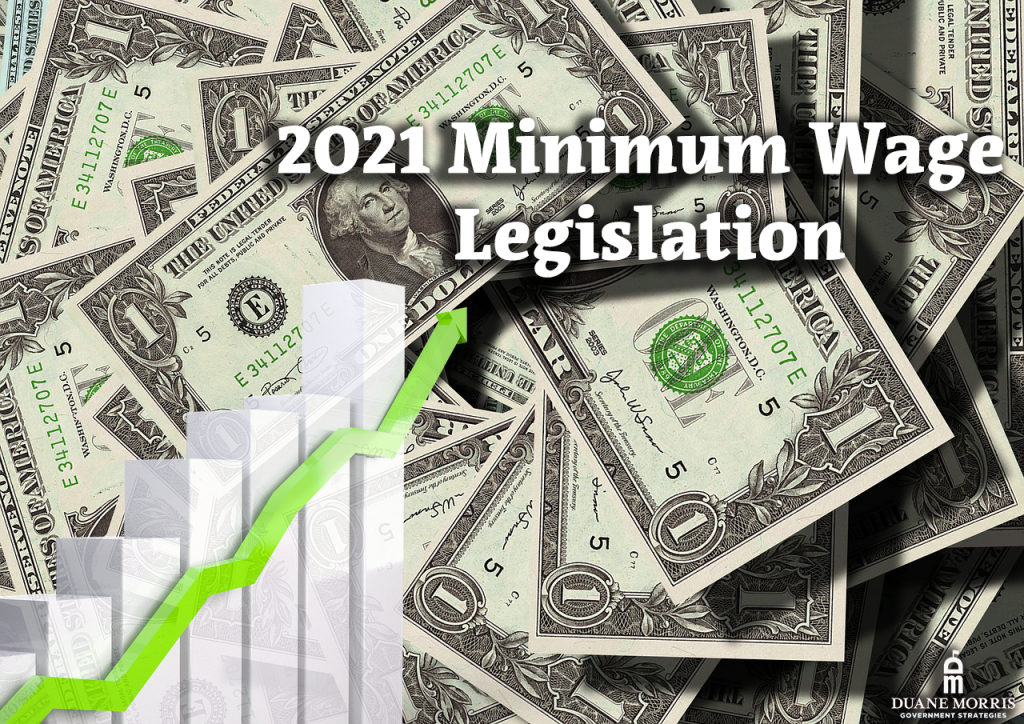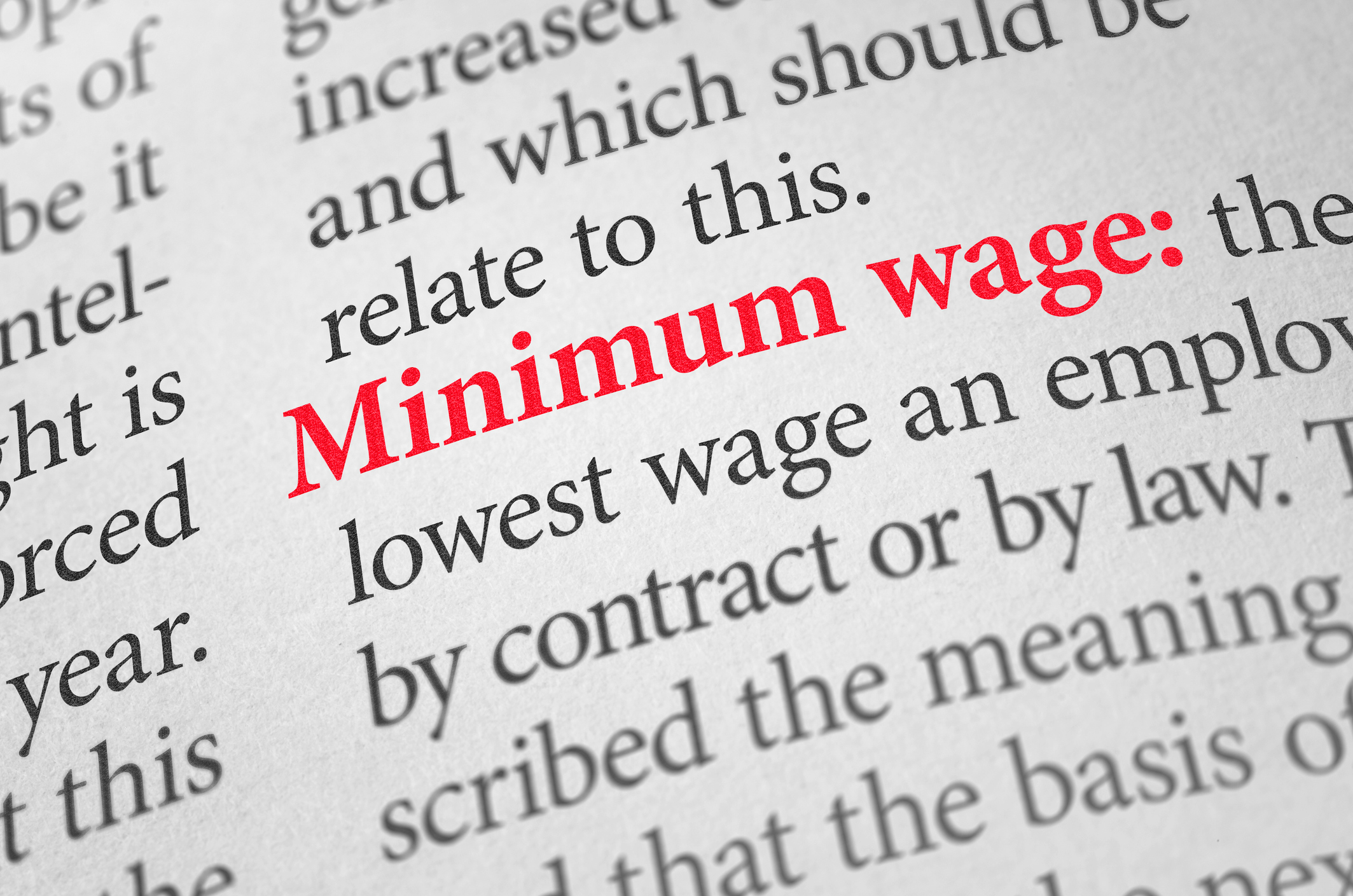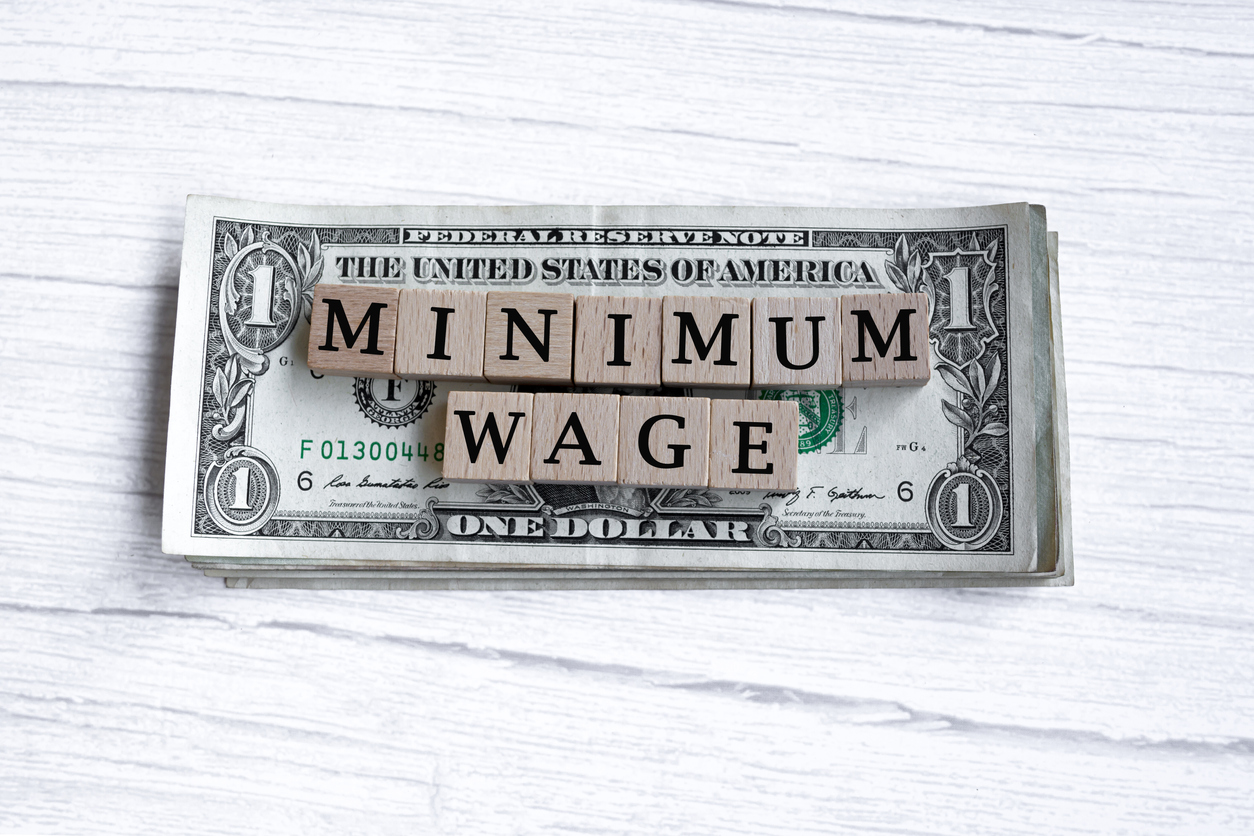
The current federal minimum wage for covered nonexempt workers is $7.25 per hour. However, many states have their own minimum wage laws. For example, 16 states and Puerto Rico have minimum wages that equal the federal rate, 29 states and the District of Columbia have a higher rate than the federal minimum wage. Five states have no state minimum wage law. When an employee is subject to federal and state minimum wages, the employee receives the higher of the two. Nevertheless, there are several exceptions to state and federal minimum wage laws, including tipped employees and some agricultural and farmworkers. In recent years, numerous states have passed or introduced legislation that would immediately raise their minimum wage several dollars or raise it gradually over several years. Below is our latest update on 2021 minimum wage legislation.
Florida Minimum Wage Increase Amendment
On November 3, 2020, Florida voters overwhelmingly passed Amendment 2 to the Florida Constitution. Amendment 2 passed with 6,391,753 votes for and 4,117,815 votes against (60.82% to 39.18%). Titled “Raising Florida’s Minimum Wage,” the amendment raises the state minimum wage in Florida from $8.56 per hour to $10.00 per hour effective September 30, 2021.
Following 2021, the minimum wage will increase $1.00 every September 30 until 2026, when it reaches $15.00 per hour. Starting on September 30, 2027, each subsequent increase in the minimum wage will be adjusted for inflation. To do so, the state Agency for Workforce Innovation will increase the current minimum wage by the rate of inflation for the 12 months before September 1 of that year using CPI-W, the consumer price index for urban wage earners and clerical workers.
In January 2021, Senate Joint Resolution 854 was introduced. SJR 854 would amend the State Constitution to authorize the Florida Legislature to introduce a reduced minimum wage for prisoners in the state correctional system, for employees convicted of a felony, employees under 21 years of age, and other hard-to-hire employees. The bill died in the Florida Senate’s Commerce and Tourism Committee in late April.
According to MIT’s “Living Wage Calculator,” the living wage for one adult with zero children in Florida is $14.82.
Delaware Minimum Wage Increase Legislation
In March 2021, the Delaware Senate passed SB 15, a bill to gradually increase Delaware’s minimum wage. The bill would increase the state’s current minimum wage by more than $1.00 per hour every year until 2025. The minimum wage is expected to increase from its current rate of $9.25 per hour to $10.50 in 2022, $11.75 in 2023, $13.25 in 2024, and finally, $15.00 in 2025. According to Delaware labor laws, agricultural and farm workers would be exempt from the bill.
After passing the Senate, the Delaware House assigned SB 15 to the Economic Development/Banking/Insurance & Commerce Committee. The committee reported the bill with a final vote of six favorable, two on its merits, and zero unfavorable.
The bill has been assigned to the House Appropriations Committee, where members will discuss its fiscal impact. If approved, it will move to the House for a floor vote.
According to MIT’s “Living Wage Calculator,” the living wage for one adult with zero children in Delaware is $15.32.
North Carolina Minimum Wage Increase Bills
North Carolina is among the states with a minimum wage equivalent to the federal rate. SB 673, in draft form, proposes to raise North Carolina’s minimum wage from $7.25 per hour to $10.35 per hour effective January 1, 2022. Furthermore, the bill would raise the minimum wage to $15.00 per hour at the start of 2023. On September 30, 2023, and each September 30 after that, the Commissioner of Labor would adjust the state minimum wage for inflation using the consumer price index for the 12 months before September 1.
Additionally, SB 673 would increase and phase out the tipped employee minimum wage through 2025, repeal the subminimum wage for specified workers, and repeal exemptions from the minimum wage for agricultural and domestic workers. The bill would bring the tipped employee minimum wage in North Carolina to $6.50 per hour in 2022, $9.50 in 2023, $12.50 in 2024, and $15.00 in 2025. In 2026, the bill would eliminate tips from the calculation of an employee’s wages.
HB 612, introduced on April 20, would make statutory changes similar to Senate Bill 673. Both bills passed first reading in their draft forms and have been referred to the Committee on Rules, Calendar, and Operations of the House and Senate.
According to MIT’s “Living Wage Calculator,” the living wage for one adult with zero children in North Carolina is $14.72.
New Jersey Minimum Wage Increase Legislation
In February of 2019, the New Jersey Governor, Phil Murphy, signed Assembly Bill 15 into law. A15 raises the minimum wage, over time, to $15.00 per hour from $8.85 as of January 2019. The bill includes a provision to increase the state minimum wage proportionally with the consumer price index for urban wage earners and clerical workers (CPI-W) during the 12 months before each year on September 30. Furthermore, if the federal minimum wage rate exceeds the state rate, the state would adopt the federal rate, and subsequent CPI-W adjustments would be applied to the federal rate.
If the following increases are greater than the CPI-W adjustment to the state minimum wage, the bill states that the New Jersey minimum wage would be raised to $9.50 per hour in July of 2019, $11.00 in January 2020, $11.55 in January 2021, and increased $1.15 every year from 2022 to 2024 until it reaches $15.00 per hour. The minimum wage would continue increasing with CPI-W after it reaches $15.00 per hour in 2024.
For employers with fewer than ten employees, farm laborers under the age of 18, and employees in seasonal employment, the minimum wage will gradually increase at a slower pace to $15.00 per hour in 2029. Regarding tipped employees, the minimum wage rate will increase to $9.87 per hour by 2024.
According to MIT’s “Living Wage Calculator,” the living wage for one adult with zero children in New Jersey is $16.20.
Rhode Island Minimum Wage Increase Legislation
In Rhode Island, a state with a higher minimum wage than the federal rate, HB 5130 was introduced in the State House on January 25, 2021. The bill would gradually raise Rhode Island’s state minimum wage from its current rate of $11.50 per hour to $15.00 per hour by 2025. The state minimum wage would rise to $12.25 per hour starting in January 2022, $13.00 in 2023, $14.00 in 2024, and $15.00 in 2025.
The House passed the bill on May 6 and the Senate passed it on May 18. The General Assembly sent the bill to Governor Dan McKee’s desk on May 19, 2021.
According to MIT’s “Living Wage Calculator,” the living wage for one adult with zero children in Rhode Island is $14.79.
Latest News
photo credit: iStock.com/designer491 According to the National Center for Education Statistics, “Property taxes contribute 30% or more of total public-school funding in 29 states.” However, using property tax income to fund public schools can be [...]
Photo credit: iStock.com/Zerbor Could your state raise its minimum wage in 2023 or in the near future? In 2021, the Pew Research Center reported that six-in-ten U.S. adults (62%) favored raising the federal minimum wage [...]
Film strip in perspective. 3D isometric film strip. Cinema Background. Template cinema festival or presentation with place for your text. Movie time and entertainment concept. Vector illustration The Georgia film tax credit was designed to [...]
Photo credit: iStock.com/Jennifer Miranda In 2022, there has been a sizable amount of legislative activity surrounding state minimum wages across the country, following a flurry of activity in 2021. Most recently, voters in the midterm [...]






Stay In Touch